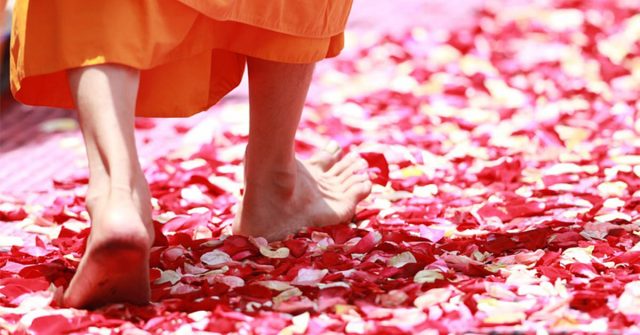The word Buddha means The Awakened One, which derives from the Sanskrit root Budh – ‘to wake’. A Buddha is one who has awakened through knowing and has discovered the way to end suffering. The historical Buddha Siddhartha was not a deity. He was a wise human being who spent years in self-observation and meditation, finding a balanced way of achieving wisdom, compassion and freedom from suffering.
The Fundamental Buddhist Doctrines Include:
- The Chain of Causation: Ignorance leads to suffering, and eliminating ignorance leads to freedom from suffering.
- The Three Signs of Being, That Which Leads To Suffering: 1. Nothing found in the physical world can bring lasting deep satisfaction, 2. Impermanence, which refers not only to the fact that all conditioned things eventually cease to exist, but also that all conditioned things are in a constant state of flux, today imagined as the atoms constituting your body are constantly being replaced. 3. Non-Self: The “I” we are conditioned to believe as who we are is not real, and learned after birth, after we already existed. Identifying our selves as what we are not, as things that will forever change and eventually end, causes suffering. The real “I” has no end.
- The Four Noble Truths of: Suffering, the Origin of Suffering, the Ceasing of Suffering, the Way leading to the Ceasing of Suffering: called The Noble Eightfold Path
- The Noble Eightfold Path: Right View, Right Resolve, Right Mindfulness, Right Speech, Right Conduct, Right Effort, Right Livelihood and Right Samadhi: Following these 8 steps allows one to let go of the cravings and desires that cause suffering and to attain inner bliss.
Buddhists value virtues such as humanity, patience, kindness to all living things, giving, and compassion. The idea to cause no harm to animals, plants and the world in general is a gentle and solid foundation of their teaching. Buddhism’s goal is to help people live peaceful lives.
One of the most profound teachings within Buddhism is their viewpoint on change and the impermanence of life. They believe that nothing in the world is permanent or fixed, but rather is forever changing and never the same. We are never the same people, either mentally, emotionally, or physically that we were a few years ago.
Science has recently confirmed this, stating that all cells in the body are replaced every seven to ten years. By trying to hold onto an idea of who we are, once were, or who someone or something else “should be,” we are only setting ourselves up to suffer as they all are destined to change.
Researchers also recently confirmed that within the realm of neuroscience, the human body is changing all of the time, meaning that there isn’t a stable ‘self’ for any person.
The University of British Columbia’s Evan Thomson explains that; “from a neuroscience perspective, the brain and body is constantly in flux. There’s nothing that corresponds to the sense that there’s an unchanging self.”
Neuroplasticity, a concept coined by neuroscientists, states that our brain is malleable and able to change. This means the brain can change and adapt in many aspects, opening up possibilities for growth.
The potential within these statements is that regardless of how we think ourselves to be, everyone has the potential at any moment to rewrite their life stories and live the lives they’ve dreamed of in their hearts. We can achieve anything we put our minds to.
The Buddha left a few profound words of wisdom for us;
“Nothing is permanent. Everything is subject to change. Being is always becoming.”
“‘All conditioned things are impermanent’ — when one sees this with wisdom, one turns away from suffering.”
“Better it is to live one day seeing the rise and fall of things than to live a hundred years without ever seeing the rise and fall of things.”
“As a water bead on a lotus leaf, as water on a red lily, does not adhere, so the sage does not adhere to the seen, the heard, or the sensed.”


















